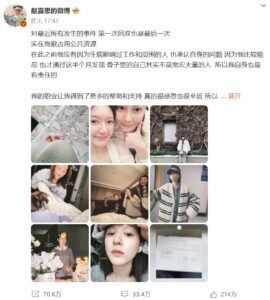Hu Tong Episode 21 Recap
> Hu Tong Recap
Sun Xiaomin addressed the night market bosses, noting that while their businesses were thriving, the market itself was becoming increasingly chaotic due to their bad habits and unfair practices. She specifically accused them of using "spring rulers" to shortchange customers, engaging in malicious price competition, and refusing returns for defective items, which often led to arguments and even fights. Liuzi, in particular, was singled out for his aggressive behavior.
The bosses, feeling wronged, argued that they were forced to cut prices because of competitors from the Dongsi night market, leading to significant losses. Liuzi admitted to selling items with minor defects but claimed he was honest about them and offered discounts.
He also shared an incident where he refused a return for a pair of jeans with large stains, believing the customer had damaged them, and argued that using altered measuring tapes was common practice and necessary to make a profit given the difficulties in sourcing goods from Guangzhou. Other bosses echoed his sentiments, stating everyone operated this way and they needed to earn a living.
Sun Xiaomin urged the Shichahai vendors to operate ethically, hoping they could set an example for other night markets. However, the bosses were skeptical, arguing that if only they followed the rules while others continued price-cutting, they would suffer financial losses. Later, Lin Weidong found Sun Xiaomin still visibly upset. She expressed frustration that her efforts for everyone's good were not being accepted, fearing the night market's eventual demise.
Lin Weidong acknowledged her point but reminded her that deeply rooted issues and vicious competition wouldn't change overnight. Sun Xiaomin passionately declared her desire for self-employed individuals to earn respect and advocated for prioritizing customer satisfaction over pure profit, suggesting they could uplift their reputation while serving the citizens of Beijing. Both Juanzi and Suo Lanqi remarked that Sun Xiaomin was increasingly sounding like Tian Zao, who often convened meetings to impart similar wisdom.
Lin Weidong, while understanding Sun Xiaomin's ideals, pointed out that the less educated vendors were primarily focused on their families' livelihoods, making radical changes difficult. Sun Xiaomin, however, remained resolute, insisting that change was necessary. Tian Zao brought her nephew, Gangzi, to a knitting factory to find him a job. The factory director was initially hesitant, noting that Gangzi, a "rough man" with no specific skills, wasn't suited for the factory's delicate work.
Tian Zao, however, insisted that Gangzi was diligent and could handle tasks like cleaning and moving goods, assuring the director that Gangzi alone could keep the entire factory spotless. The director eventually agreed to let Gangzi try. Later, Sun Xiaomin confided in Tian Zao about her struggles to reform the night market. Tian Zao acknowledged that changing people's deeply ingrained habits was difficult and would take time, advising patience.
When Sun Xiaomin expressed uncertainty about how to proceed, Tian Zao encouraged her to start with their own Shichahai vendors and to manage boldly. Tian Zao reassured her daughter that she supported her efforts, emphasizing that Sun Xiaomin was acting for the greater good, not for personal gain. A customer demanded a refund from Liuzi for new jeans with a hole, but Liuzi insisted the customer had caused the damage, leading to a heated argument.
Sun Xiaomin intervened, confirmed the defect, and paid the customer 20 yuan for the jeans, chastising Liuzi for his dishonest practices. She sternly warned him against such behavior in the future. Liuzi begrudgingly offered the 20 yuan to Lin Weidong for Sun Xiaomin, but then pocketed it again. Later that evening, after the market closed, Xiaowuzi, a boss from the Dongsi night market, along with his group, approached Sun Xiaomin.
Xiaowuzi, adopting a respectful tone, acknowledged Sun Xiaomin's integrity and apologized for past aggressive tactics, like demanding stalls to remove similar goods. He explained that the ongoing price wars for identical products were hurting everyone's profits. Sun Xiaomin agreed to discuss a solution, suggesting they meet at Hongtai Tea House the following afternoon at 2 PM to negotiate more effectively with a smaller, decision-making group.
Lin Weidong, initially angry at Xiaowuzi bringing a large group, proposed fighting them off, but Sun Xiaomin countered that violence would only lead to more retaliation. She asserted her intention to resolve the matter peacefully, asking for their trust. Sun Xiaomin and Lin Weidong arrived at the teahouse first. Sun Xiaomin shared that she had an idea but hadn't finalized it.
When Xiaowuzi and his companions arrived, Xiaowuzi, visibly anxious, dismissed the idea of slowly savoring tea, eager to find a quick resolution to their business problems. Sun Xiaomin then presented her solution.
Acknowledging that jeans and sportswear were the most heavily overlapping goods, she proposed two options: either all vendors could continue selling these items but adhere to a unified, non-negotiable pricing policy, or the two markets could specialize, with one selling jeans and the other sportswear, buying back each other's excess stock at cost and coordinating future purchases from Guangzhou to avoid direct competition. For other similar goods, they would follow the unified pricing rule. Xiaowuzi readily agreed to these points.
Sun Xiaomin then added a crucial condition: all stalls must offer unconditional returns and exchanges for goods with quality issues. Xiaowuzi hesitated at this, but Lin Weidong reinforced Sun Xiaomin's emphasis on long-term business and customer trust, convincing Xiaowuzi to reluctantly agree. Sun Xiaomin convened her fellow Shichahai vendors to announce the agreement reached with Xiaowuzi.
Liuzi expressed concern that the Dongsi night market vendors might not honor the agreement, leaving their own group at a disadvantage if they ceased price competition. Sun Xiaomin conceded she couldn't guarantee others would follow suit, but she firmly stated that continuing their current practices would lead to a dead end. She declared that she had acted on behalf of everyone and insisted they must all adhere to the new rules, regardless of their personal feelings.
Juanzi later joked to Lin Weidong that Sun Xiaomin was essentially turning the night market into a neighborhood committee, forcing everyone to comply. Privately, Sun Xiaomin admitted to Tian Zao that she felt uncertain if her plan would succeed, and that even her friends like Liuzi, Dongzi, Huozi, and Juanzi were reluctant. Tian Zao, however, affirmed that organizing the self-employed to collaboratively set rules was precisely what was needed, rather than constantly relying on external government offices.
She reiterated her full support, telling Sun Xiaomin to boldly pursue what she knew was right. As Sun Xiaomin's new rules took effect, Liuzi and other vendors in the Shichahai night market, including Lin Weidong, experienced a significant drop in sales, as customers gravitated towards cheaper goods sold by other vendors who did not adhere to the unified pricing. Lin Weidong’s income decreased by at least 30%, and Liuzi lamented their losses, expressing fear of Sun Xiaomin's sternness.
Xiaowuzi from the Dongsi night market also found his sales struggling and complained to Sun Xiaomin. She acknowledged the difficulty but pointed out that some stalls were already beginning to learn from their approach. She urged Xiaowuzi to encourage his vendors to hold out until the end of the month, after which she would reconsider if the plan still wasn't working.
Meanwhile, at the knitting factory, Gangzi proved himself to be an exceptionally diligent and helpful worker, readily assisting his colleagues with tasks like fixing a blocked toilet, fetching water, and pouring drinks. His dedication earned him the admiration of his co-workers and high praise from the factory director. Sun Tie continued his physical therapy, showing improvement in his walking, though his right hand remained weak.
To aid his recovery, Suo Qian generously gifted him a pair of valuable exercise walnuts to strengthen his grip, which Sun Tie immediately began using. Upon receiving his first month's modest salary, Gangzi joyfully bought gifts for all his neighbors in the courtyard, expressing gratitude for their care since his arrival in Beijing. Meanwhile, Sun Xiaomin's commitment to honest business practices began to bear fruit.
The few vendors who adhered to her new rules, including Liuzi and Lin Weidong, started attracting a steady stream of returning customers. Other stall owners observed this phenomenon with surprise and frustration. They found that despite their own lower prices, customers preferred to buy from Liuzi and Lin Weidong's bustling stalls, willingly paying more for the assurance of quality and easy returns.
One vendor recounted a customer choosing Liuzi's stall, praising the "benevolent and righteous" owner for readily accepting returns, despite Liuzi's former reputation as a troublemaker. Recognizing the profound impact of Sun Xiaomin's management, particularly how the Shichahai and Dongsi vendors were maintaining prices and offering unconditional returns, other stall owners realized the value of trust and reputation. Faced with dwindling sales, they resolved to return to their own stalls and implement similar reforms.
The Shichahai vendors, including Liuzi, were now enjoying booming business and invited Sun Xiaomin to dinner to celebrate their success and express their gratitude. They acknowledged that while her initial plan had caused some losses, their unwavering commitment had led to profits surpassing previous levels, leaving other price-cutting vendors astonished. Lin Weidong playfully reminded them of their initial resistance, but everyone readily admitted their error and pledged their allegiance to Sun Xiaomin's leadership.
Lin Weidong also conveyed an invitation from Xiaowuzi and the Dongsi market vendors for a celebratory meal. Sun Xiaomin, however, declined the lavish dinner, stating that Xiaowuzi's successful adoption of ethical business practices was thanks enough. She then explained her business philosophy to the group, emphasizing that "reputation and integrity" were the true keys to success, much like Beijing's century-old brands. She articulated that once customers trusted them, they would willingly pay a little more, confidently shopping at their stalls.
The vendors, now experiencing the positive impact firsthand, agreed, noting that the customers' praise and their own sense of satisfaction further motivated them to provide excellent service. They all raised their cups in a toast to Sun Xiaomin. After graduating from night university, Sun Xiaomin went to the magazine office to find Lin Weimin, hoping to secure a position in the editorial department.
An office worker informed her that Lin Weimin no longer worked there but was now the manager of the magazine's "third production" department, a side business, and provided her with the address. Sun Xiaomin found him at his new, bustling business location. She reiterated her desire to join the editorial department, acknowledging his previous reservations about her diploma but expressing her determination to try.
Lin Weimin, who had seemingly found success and financial gain in his new entrepreneurial venture, tried to dissuade her. He argued that times had changed and questioned why she was so persistent about joining a "poor government" editorial office when she was already doing well and making money at the night market. Sun Xiaomin, observing his new demeanor and priorities, sadly remarked that he had changed.



























